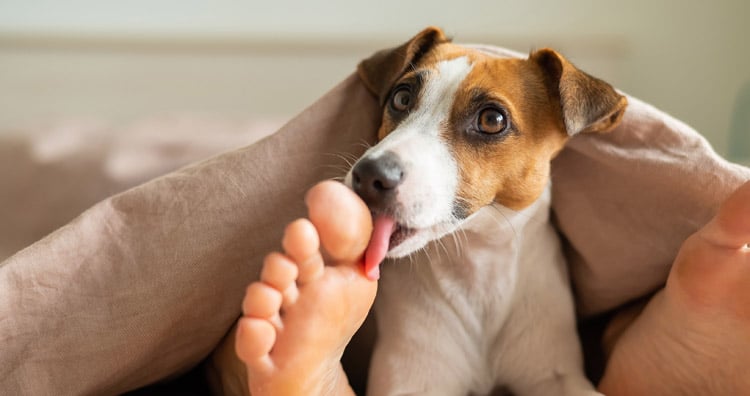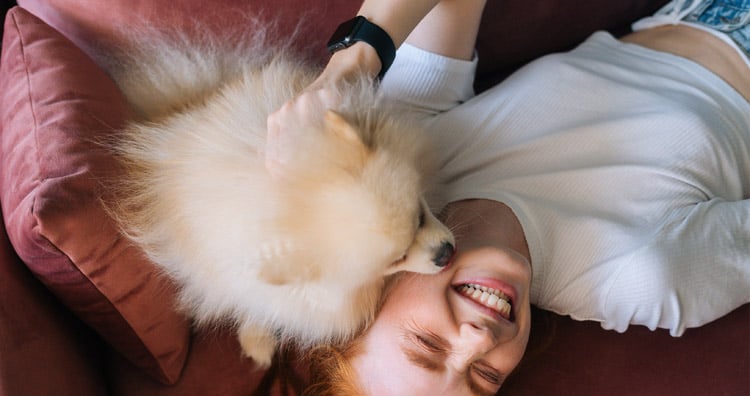- Dictionary
- 2023
What does it mean when your dog licks you?
Licking is a way of showing affection, although that is not the only reason why they do it. We can give you the clues that help you to understand your dog better when he licks you.
He loves you and is loyal. Our four-footed friends express their feelings through signals with their bodies. This is why some people think that their way of kissing you is to lick your face and, in fact, this is often true. Dogs strengthen links with their loved ones by licking them, something they learned as puppies when their mother licked them to clean them. Perhaps your dog is one of those that lick your feet instead of your face to show affection and appreciation. If you are sitting quietly on the sofa and all of a sudden he gives you a lick and stays beside you without moving, it is likely to be a gesture of affection and what he wants is for you to caress him, which means that your bond is firm. When the subject of the licks is your ears, this means that your dog is trying to clean them for you as though you were a puppy. This is considered as a great show of loyalty.
And if it isn’t for love?
He’s hungry. Without any apparent reason he comes and starts licking your face. It is a way to call your attention and ask you for something. Perhaps he wants to play or say: ‘I’m starving!’ and ask you to give him something to eat.
This behaviour is explained by the instinct that puppies have to lick their mother’s mouth to get her to regurgitate food for them to eat. According to this instinct, the dog licks your face to try to get food.
He likes how you taste. A dog’s sense of taste is precisely another of the reasons why your best friend licks your face, feet or hands. Not just because he can smell and taste in your face your latest meal. It is also a fact that dogs can detect and enjoy the salty sweat on your skin, the soap you wash with or your moisturising cream. If you don’t mind, there is no problem, unless these products have some component that is bad for dogs or can cause them allergies.

He’s anxious. When your best friend is worried or stressed, licking you helps him to feel quieter and more relaxed. For example, when you come home he doesn’t stop wagging his tail and jumping up to show his joy at seeing you again. So he licks you to greet you and say hallo. However, it could also be to release the stress that he has suffered in being so long without you. If a dog often suffers anxiety due to separation, he can even lick himself when you are away to reduce the tension; dogs can release endorphins by licking and this relaxes them.
Discomfort. Physical contact between humans is different from contact between dogs. Even so, we do tend to embrace a dog to show him our love, but that embrace is not always well received. In some cases, the dog will even lick you to express his discomfort. That’s why it’s a good thing to learn to read all the signals he transmits when we give him a hug, observing whether he is relaxed or tense, whether he is comfortable or wants to go out running.
Let’s play? When the dog licks you without any special reason and you see that he is perfectly happy, it means that he is bored and wants to get your attention. It’s a gentle and affectionate way of asking you to listen to him and come and play.
Minor injuries. Many animals instinctively lick their wounds after surviving an attack by a predator, thus we have the expression ‘lick your wounds’. The smell and flavour of blood attracts them and they lick a wound to analyse it. Dog saliva has antiseptic properties, but also there are numerous bacteria which are not at all good for your own health. Therefore, in this case it’s better not to let him lick you.
A show of empathy. If your dog is worried about you, it is possible that he will try to lick you to make you feel better. In a study by the Psychology department at Goldsmiths (University of London), the researchers asked several pet parents to pretend to cry. They discovered that it was more likely that their dogs would lick them in this situation than when they were simply talking. A query then arose: was it not that these dogs were showing learned behaviour since they were accustomed to receiving a reward for approaching their pet parents when they are sad? It’s possible, but most people still think that dogs, up to a certain point at least, are able to share and understand human feelings.

Some breeds lick more than others
There is no scientific study that has identified which dog breeds tend to lick more than others, but it is possible to see a pattern according to the personality and characteristics of each one.
For example, Labrador retrievers are well known as being more loving and, therefore, a breed that licks a lot, particularly the puppies. Poodles are playful and loving, so they lick a lot to get attention and love. Also due to nervousness, as this is one of the breeds that suffers anxiety for separation. The Golden retriever is affectionate and loyal to its pet parents and its toys, which it will also give a good dose of licking. Of course, anyone who lives with a beagle will know that beagles also love to lick furniture and the floor! They enjoy trying and exploring new things.
On the other hand, breeds considered as hunting dogs, greyhounds and the borzoi, for example, and Arctic breeds such as the Siberian husky, tend to lick less than others.
And if you really don’t like it…
Are you one of those who in spite of loving your dog you really do not like being licked? In this case, to get him to stop licking, try to ignore this behaviour. You might even try getting up quietly and moving to another room with the door closed. If you achieve your objective, don’t forget to reward your dog and give him a lot of attention afterwards so that he doesn’t do it again. According to the experts, the licking should disappear bit by bit as your dog discovers that it doesn’t win him any reward.
If what happens is that he is licking you or himself excessively, consult your vet to check that there is no problem and get advice on how to deal with it.
Goldsmiths
link a la web: https://research.gold.ac.uk/id/eprint/7074/